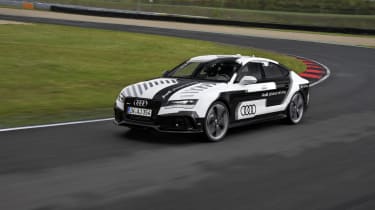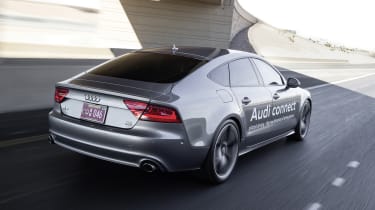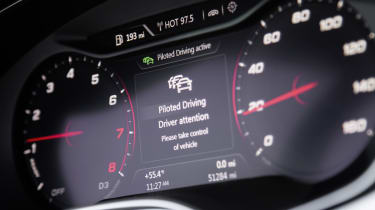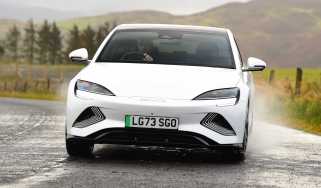Audi RS7 driverless car tech on its way to road cars
A driverless Audi RS7 Sportback will tackle Germany's Hockenheim circuit, previewing autonomous tech that's coming to the road
Audi is debuting a driverless example of its new RS7 Sportback at the Hockenheim race circuit in Germany next week, with the company claiming some of the technology should be available on future Audi models "before the end of the decade".
The images and video show incredibly complex computer systems guiding the RS7's steering, brakes, throttle and transmission using GPS, radio signals and a 3D imaging camera to set the scorching lap. Other than that, the autonomous RS7 remains identical to a production model.
The driverless Audi will also appear soon at the famous Nurburgring Nordschleife, which features 154 corners and 13 miles of demanding track, as it bids to set a benchmark lap time for an autonomous car.
With 552bhp and a 190mph top speed, the driverless RS7 is capable of acheiving 1.1g cornering forces, driving as hard as it would with a skilled racing driver at the wheel. Audi, however, says the tech is even more useful of normal road use where it can negotiate stop/start traffic without driver input. This is why Audi is also unveiling the Piloted Driving technology on its road cars.
Audi claims the RS7's driverless track laps are essentially a "test bed" for production use of the technology. New images show the tech in action on the road with dashboard displays revealing how the system would look in a road car. Dubbed Traffic Jam Pilot, the system can help drivers by taking over at speeds up to 37mph.
When a traffic jam is detected, the set-up uses sensors and a new 80-metre laser scanner to take control of the car, accelerating and braking automatically. It then disengages when the road ahead clears.
Audi also demonstrated its new Piloted Parking system, which builds on the self-parking tech that's already widely available. Similar to Tesla's new Autopilot feature, this allows you to get out of the car and operate it remotely from an app on your smartphone. It then uses the scanner and four 360-degree cameras to hunt out a space and park in it, with zero input.
Find out everything you need to know about driverless cars here.
Find a car with the experts






